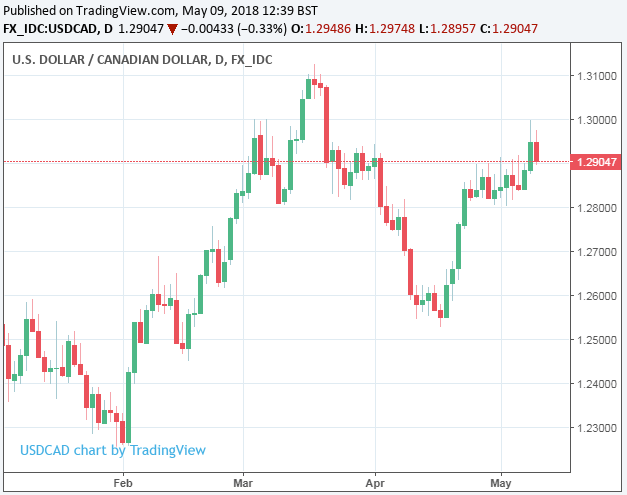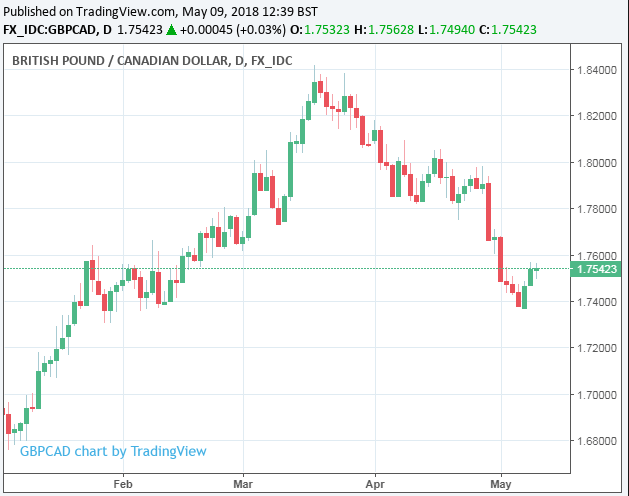The Canadian Dollar Rises with Oil Prices but Strategists say "Sell" the Bounce
- Written by: James Skinner
-CAD rises sharply in tandem with oil after US abandons Iran deal.
-CAD and oil bounce will be short-lived say TD Securities strategists.
-Sell the CAD, says TD Securities, as macro-backdrop has deteriorated.

© Goroden Kkoff, Adobe Stock
The Canadian Dollar rose Wednesday after President Donald Trump's decision to withdraw from the so called Iran nuclear deal saw markets respond with a steady bid for oil linked currencies, although some strategists are describing this as a "sell-able bounce".
President Trump has withdrawn from the Iranian nuclear deal, describing it as "one of the worst and most one-sided transactions the United States has ever entered into", and pledged to reinstate economic sanctions against Iran in a move that threatens to shut the Gulf nation off from the global oil market.
Critics of the move have said the pact was the best option available for preventing Iran from gaining access to nuclear weapons and that a US withdrawal will raise tensions in the Middle East.
The financial fallout has seen a near-3% rise in the price of Brent and WTI crude oil that pundits would traditionally cite as a reason to bet on a subsequent gain for the Canadian Dollar.
However, strategists at Canada-headquartered investment bank TD Securities have drawn the opposite interpretation, advocating to clients that they use Wednesday's price action as an opportunity to bet on renewed fall in Loonie exchange rates.
"We were suspicious about the positive feedback loop from a geopolitical shock in oil prices to CAD and despite the outcome look to maintain our short CADJPY trade," says Mark McCormick, North American head of FX strategy at TD Securities, in a note Tuesday.
Oil is Canada's largest single export so any increase in prices tends to lift the Loonie, as it has done this Wednesday, although McCormick and the TD team say this week's rise in the oil price will lead to the "wrong kind of inflation" and is unlikely to be sustained. The TD team also notes that the "oil futures curve" is inverted, denoting an expectation within the market that oil prices will soon resume their decline.
So instead of betting on the Loonie, the TD Securities FX team is betting against it, arguing the currency will fall in value relative to the Japanese Yen over coming weeks. The Yen, which is a safe haven currency that tends to rise during times of uncertainty, offers traders the opportunity to profit from any unease over the Iran deal as well as a continued weakening of Canadian economic fundamentals.
TD Securities entered the trade around 85.10 and is targeting a move down to 81.50, with a stop loss at 86.85.

Above: USD/CAD rate shown at daily intervals.
The CAD/JPY rate was quoted 0.98% higher at 85.01 Wednesday while the USD/CAD rate was 0.38% lower at 1.2901 and the Pound-to-Canadian-Dollar rate was 0.02% lower at 1.7544.
WTI crude oil was quoted 2.88% higher at $71.1 Wednesday while Brent crude oil was 2.89% higher at $77.0. These benchmarks are up 17.59% and 15.19% respectively for the 2018 year to date.

Above: Pound-to-Canadian-Dollar rate shown at daily intervals.
"We think the macro story has turned increasingly negative. The deterioration in the capital flow story is strong evidence. But there are some big event risks in the pipeline that could offer the loonie a sell-able bounce," McCormick adds, pointing to the Iran decision and ongoing talks to renegotiate the North American Free Trade Agreement (NAFTA).
Economic growth slowed markedly in Canada during the first two months of the year, leading traders to mark down their expectations for further interest rate rises from the Bank of Canada and dealing a blow to the Canadian Dollar. More recently, data showed the trade deficit widened to a new record in March as imports grew faster than exports, while the housing market also appears to have slowed during the first quarter.
However, despite this, the case for a cautious approach toward the Loonie may well remain intact regardless of any changes in the current economic situation on the ground in Canada. After all, time is ticking on and talks to renegotiate NAFTA are yet to bear fruit.
Advertisement
Get up to 5% more foreign exchange by using a specialist provider to get closer to the real market rate and avoid the gaping spreads charged by your bank when providing currency. Learn more here.
NAFTA Talks Still Loom Over the CAD
Canadian, Mexican and US negotiators are in Washington all week attempting to thrash out a deal. However, hopes of a breakthrough have been raised repeatedly in recent months, only to be dashed upon the rocks of reality shortly by fresh disagreement over contentious demands, often from the US.
"If the negotiations really were to drag on until year-end that would no doubt be a bad sign for the Canadian currency. We expect that the USD-CAD exchange rate – driven by a stronger USD – will be under upside pressure in any case over the coming months," says Thu Lan Nguyen, an analyst at Commerzbank, in a recent note.
An eventual deal is important for the Loonie because analysts have previously estimated a withdrawal by the US could see the currency fall by as much as 20%. However, the Mexican presidential election is due in July and US midterm elections are set to become of increasing importance for lawmakers as November approaches.
"We had only expected a very moderate uptrend as we assumed that the Bank of Canada would continue to hike interest rates, thus supporting the currency. But that is by no means certain if the NAFTA uncertainty was to continue and put pressure on the economic outlook," Lan Nguyen adds.
The net effect of deadlock in the negotiations this month could be that talks end up placed on hold until year-end, leaving a key source of uncertainty hang over the head of the Canadian economy, and Dollar, for months longer. This may then deter the Bank of Canada from raising its interest rate again, which would be a further negative for the Loonie, although not all strategists have a bearish view on the currency.
"The rules of origin remains the most contentious and the focus is on the automobile industry as it “governs how much regional content a car must have to qualify for Nafta’s duty-free benefits, and requiring certain portions of a car to be built by people earning higher wages”. Whatever the outcome, higher inflation is highly likely which could bring rate hikes back to the BOC table," says Saktiandi Supaat, an FX strategist at Maybank in Singapore. "We continue to see downside risks to the USDCAD."
Supaat and the Maybank team say the BoC is likely to carry on raising interest rate regardless of what happens with the NAFTA deal and that, when combined with the current "oversold" condition of Canadian Dollar exchange rates, the Loonie may soon come onto a more stable footing. They flag the 1.2720, 1.2638 and 1.2560 levels as likely targets for the USD/CAD exchange rate over the coming weeks.
Advertisement
Get up to 5% more foreign exchange by using a specialist provider to get closer to the real market rate and avoid the gaping spreads charged by your bank when providing currency. Learn more here.




